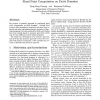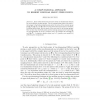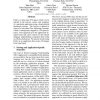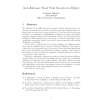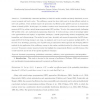19 search results - page 1 / 4 » A Syntactic Approach to Fixed Point Computation on Finite Do... |
LFP
1992
13 years 6 months ago
1992
We propose a syntactic approach to performing fixed point computation on finite domains. Finding fixed points in finite domains for monotonic functions is an essential task when c...
MOC
2002
13 years 4 months ago
2002
Some useful information is known about the fundamental domain for certain Hilbert modular groups. The six nonequivalent points with nontrivial isotropy in the fundamental domains u...
COLING
2002
13 years 4 months ago
2002
Parsli is a finite-state (FS) parser which can be tailored to the lexicon, syntax, and semantics of a particular application using a hand-editable declarative lexicon. The lexicon...
ICDE
2008
IEEE
14 years 6 months ago
2008
IEEE
ct The backbone of the XML data model, namely ordered, unranked trees, is inherently recursive and it is natural to equip the associated languages with constructs that can query su...
EOR
2010
13 years 4 months ago
2010
Abstract: Probabilistically constrained problems, in which the random variables are finitely distributed, are nonconvex in general and hard to solve. The p-efficiency concept has b...
